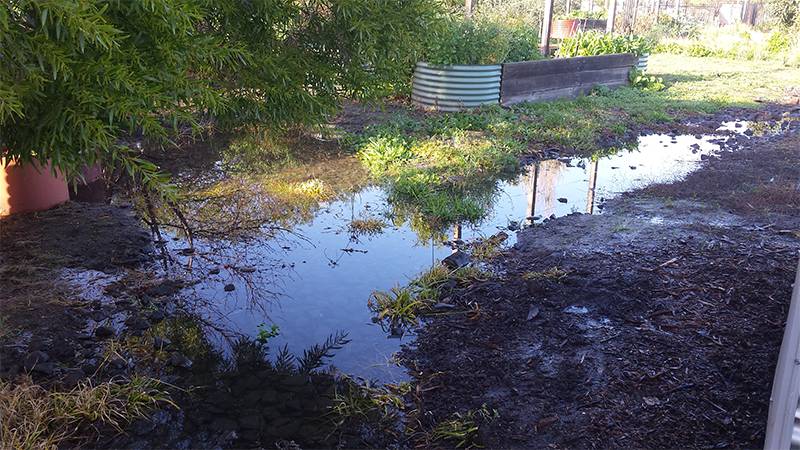BUSINESS PARTNER: AECOM
COMMUNITY PARTNER: CERES COMMUNITY ENVIRONMENT PARK
Pro bono services provided by AECOM: concept design for a constructed wetland, detailed engineering analysis of the dam lining, a planting guide, wetland management reports and educational texts explaining how a wetland is part of a water treatment train.
OVERVIEW
CERES Community Environment Park is a self-funded, non-profit organisation focussed on community based learning and action. One thousand people a day visit their 9.5-acre site in Melbourne’s inner north.
A core part of CERES programs is delivering environmental education to primary school children. Many of the most popular programs are based around a dam where children identify species and learn about the complexity of aquatic eco-systems. The dam also plays an important role in recreation at CERES.
Currently the dam is used by up to four groups of 25 school children every day, is full of weeds and is subject to large fluctuations in water levels.
“A lot of visitors enjoy the dam and it’s a focus of our education programs,” says Nick Curmi, CERES Site Manager. “We don’t want the kids experience at the dam to be about mud and weeds, we want it to be about the amazing things they are collecting when they do the activities. The project with AECOM was about creating an appealing recreation place and an ideal canvas to deliver the information.”
CERES does not have the means to engage specialist technical advice on a full fee basis and needed support to source pro bono services to develop a comprehensive design for a constructed wetland.
The designs and documentation provided by AECOM will enable CERES to improve the dam’s aesthetics and increase capacity for the site to function as an education platform. Specific recommendations include improving the dam liner, installing a safety fence around one section of the dam, re-shaping the dam profile to combat water level fluctuations and using the planting list to improve species diversity and create a healthier eco system.
LEARNINGS
AECOM is a global engineering consultancy which takes great pride in its Corporate Social Responsibility initiatives. The company viewed the CERES project (one of their first in Australia via EWB Connect) as an opportunity to apply these principles and develop their pro-bono capacity.
Jonathan Hesselberg, Senior Project Manager, AECOM, says the project was good match for the Melbourne office which boasts an extensive, highly skilled Water Group, with resources to meet project needs, from a Technical Director through to Graduate Engineers.
Despite being well resourced, AECOM encountered challenges with the CERES project which Jonathan says were mainly due to the nature of pro-bono engineering projects – finding ways to account for a budget with only cost involved, managing scope changes and addressing legal and contractual risks for a zero-income project.
“We had a lot of question marks at each step,” says Jonathan. “If you could sum up the whole learning experience in one sentence, it’s “Pro bono projects need to be managed as if they are a normal project.”
Community partner CERES also faced unforeseen challenges. Nick said he found it difficult to provide timely feedback on design iterations. In his role as Site Manager, he liaises with a variety of stakeholders including education and horticulture and he found it took more time than he would have liked to get the relevant people together, get their opinions, collate all the responses and provide feedback to AECOM.
“I feel I needed more time to honour AECOM’s skill set,” says Nick. “The acknowledgement of the significance of what AECOM were offering through EWB Connect means I would like to have been more responsive.”
Nick says next time CERES is the beneficiary of a major pro bono offering, he will spend more time up front on initial introductions to understand everyone’s capacities and work with the partner to establish clear parameters on where the responsibilities lie and how best to manage the project.
IMPACT
The provision by AECOM of a concept design for a constructed wetland and related analysis and reports means CERES now has the confidence to invest in improvements to sustain one of their most important natural assets.
“The EWB Connect project with AECOM was a really beneficial way for us to get a lot of high quality advice. In my job, the most difficult thing is design, once you have a plan, you can establish an incremental approach to implementation through grants, donations and volunteers,” explains Nick. “Having the well-articulated concept designs from AECOM that our diverse stakeholders can respond to and develop into a final concept – that’s incredibly valuable to us.”
Jonathan says the project was a valuable learning experience for all the staff who were involved, particularly less experienced staff members who had the opportunity to develop their technical skills and foster their adaptability, which he says is a key skill for engineers.
“The AECOM staff got a lot of satisfaction from being involved in this project. Most of our clients are big organisations, so I really enjoyed working with a completely different organisation and creating something to benefit a different group of people,” says Jonathan.
“The EWB Connect program provides a fantastic opportunity to volunteer or be charitable with your time using your professional skills rather than dropping a gold coin in a box,” adds Jonathan. “It enables you to spend your time and expertise in a way where you are making a difference to other people, to a community – that’s the most powerful thing about it.”
Since the completion of the CERES pro bono project, AECOM, has committed to fund five pro-bono projects in 2017.


